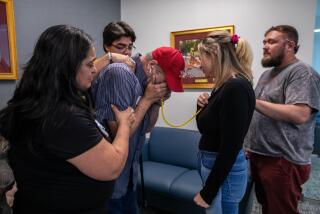Older transplant patients, donors
- Share via
CHICAGO — At 84, Juan Guano would seem an unlikely candidate for a kidney transplant.
But the kidney he received was 69.
Until recently, that kidney would not have been eligible for use in a transplant. But this summer, surgeons at Northwestern Memorial Hospital placed it into Guano, making him among the nation’s oldest organ recipients.
His surgery illustrates intersecting trends in transplant medicine: People 60 and older represent the fastest-growing age group on transplant waiting lists, and kidneys increasingly are being accepted from “expanded-criteria donors” -- older people and those who had health problems.
Guano, the grandfather of five and great-grandfather of six, beamed as he recalled being summoned to the hospital on Father’s Day for surgery. He had undergone six years of dialysis after his kidneys failed.
“I was shocked,” Guano said in Spanish. “I still can’t believe it.”
Some experts have expressed ethical concerns about using less-than-perfect kidneys for transplants, stressing the need for full disclosure to the recipients.
“The primary reason [for using these kidneys] is to try to get the most out of the existing organs to save lives. But another factor is that transplantation is lucrative,” said Arthur Caplan, director of the Center for Bioethics at University of Pennsylvania.
“We have a lot of programs doing transplants, clearly more than the supply of organs justify,” he added. “That means people want to save lives, but they also push hard to try to use organs of somewhat questionable quality. . . . Even an 84-year-old needs to know that [surgeons] are talking about a kidney that they had reservations about.”
More than 16,000 kidney transplants were performed nationwide last year, and the waiting list stands at about 81,000. The use of expanded-criteria kidneys has increased about 30% since 2002, and now accounts for about 11% of all kidney transplants.
Guano got his kidney through Northwestern’s Hispanic Transplant Program. Dr. Juan Carlos Caicedo, the program’s director, said that of the almost 3,000 kidney transplants performed by Northwestern since 1988, 188 came from donors 65 or older.
“Part of our informed consent process -- and it’s very thorough -- is to explain to every patient all the risks and benefits, and they have the last one word,” Caicedo said. “They can decide if they want it or if they don’t want it.”
Patients who accept an expanded-criteria kidney have a shorter wait for an organ -- the average wait in Illinois is five years -- and are less likely to die than patients on dialysis.
A recent study published in the Clinical Journal of the American Society of Nephrology found that about half of kidney transplant candidates older than 60 will die before getting a kidney from a deceased donor. The risk of dying before transplant is even higher for African Americans, diabetic patients, those 70 or older and those with blood type B or O.
The downside of taking an expanded-criteria kidney is a higher risk of organ rejection.
“What we are trying to do is have the best match between donor and recipient,” Caicedo said. “We don’t want to transplant kidneys from young donors into old people or vice versa. . . . In this case, we were able to use an expanded-criteria kidney that probably would not be good for a 20-year-old. And we used a kidney that in many cases would have been thrown away or not used.”
There is no automatic age cutoff on the waiting list for a kidney. Older transplant candidates typically have more risk factors, including hypertension, diabetes, obesity and arteriosclerosis. But they generally are not ruled out for transplant solely on the basis of age.
Guano went home two days after his transplant. Two days later, he was back to working on his series of Christian-inspired sculptures.
High blood pressure destroyed his original kidneys. But Guano was in otherwise good health before the transplant.
Caicedo said a transplant offered him a better quality of life than dialysis, and possibly a longer life.
--






